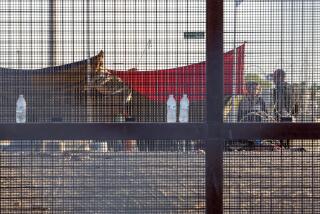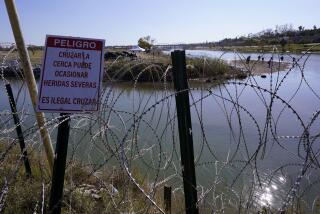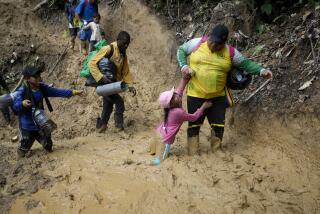Most in flood of young immigrants will be sent home, White House says

Facing mounting political pressure to stop the influx of children and teens from Central America crossing the Southwest border, the White House said for the first time Monday that most of those apprehended “will be returned” home.
Josh Earnest, the White House press secretary, said thousands of young immigrants from Honduras, Guatemala and El Salvador would be treated on “a case-by-case basis” in U.S. immigration courts, but the majority probably would not be allowed to stay.
“Based on what we know about these cases, it is unlikely that most of these kids will qualify” for asylum under humanitarian provisions in the law, Earnest said. “And what that means is that they will not have a legal basis for remaining in this country, and will be returned.”
The declaration marks a shift from a day earlier, when Homeland Security Secretary Jeh Johnson repeatedly declined to say in a TV interview whether most of the 40,000 or so unaccompanied minors from Central America who have entered the U.S. illegally since October would be deported. About 12,000 Mexican minors also have come, but most have been bused back, as the law allows.
President Obama will visit Austin, Texas, and Dallas on Wednesday and Thursday to raise money for Democrats and to talk publicly about the economy. He is not scheduled to visit the border posts or towns that have drawn droves of young migrants in what the White House has called a “humanitarian crisis.”
White House aides say that Obama doesn’t need to tour the border to be fully informed, and that senior members of the administration have visited Border Patrol stations, detention facilities and other border sites in recent weeks.
Texas Gov. Rick Perry has taunted Obama with invitations to visit the border. Sen. John Cornyn (R-Texas) joined in on Monday, urging Obama to make the trip during his fundraising tour.
Speaking on the Senate floor, Cornyn asked how Obama could seek congressional support to resolve the problem when he is “missing in action when it comes to learning for himself the very facts” to make the case.
Obama is asking Congress to provide more than $2 billion in emergency spending. The request, which the administration will unveil Tuesday, is intended to pay for more social workers and immigration judges, additional detention facilities and heightened security on the border.
Despite Earnest’s declaration, the administration has limited powers to eject the young immigrants on its own.
Under a 2008 law, unaccompanied minors from Central America must have their cases heard by an immigration judge. Most are placed with sponsors, usually family members in the U.S., for years while their cases wind through the backlogged courts.
Obama last week asked Congress to give him greater legal authority to deport the minors more quickly. But senior Democrats have shown little willingness to amend the 2008 law, which sought to curb sex trafficking and other abuses.
Several congressional aides said the administration was not pressing the issue now but may return to it later. The White House denied reports that it had pulled back its request. “We are still seeking those authorities and have made clear we will work with Congress to get those authorities,” said a senior administration official, who spoke on condition of anonymity to describe internal deliberations.
Sen. Robert Menendez (D-N.J.), chairman of the Senate Foreign Relations Committee, said Monday he had “grave concerns” about rolling back a law specifically designed to prevent human rights violations. “Let’s not forget these kids are fleeing as a last resort to escape what is too often guaranteed death at the hands of drug cartels and gangs in their countries.”
Gregory Z. Chen, director of advocacy for the American Immigration Lawyers Assn., said creating shortcuts in the law could deny children protection from violent gangs and sex traffickers.
“Any movement away from having a judge review those cases is giving them no justice at all,” Chen said.
Under the 2008 law, unaccompanied minors from countries that don’t share borders with the U.S. must be placed in the care of Homeland Security’s Office of Refugee Resettlement and “shall be promptly placed in the least restrictive setting that is in the best interest of the child.”
The law says “a child shall not be placed in a secure facility,” such as a detention camp, unless he or she poses a danger or has been charged with a crime.
Mexican children are screened by Border Patrol agents and do not have automatic access to an immigration judge.
Lisa Mascaro in the Washington bureau contributed to this report.
More to Read
Start your day right
Sign up for Essential California for news, features and recommendations from the L.A. Times and beyond in your inbox six days a week.
You may occasionally receive promotional content from the Los Angeles Times.








